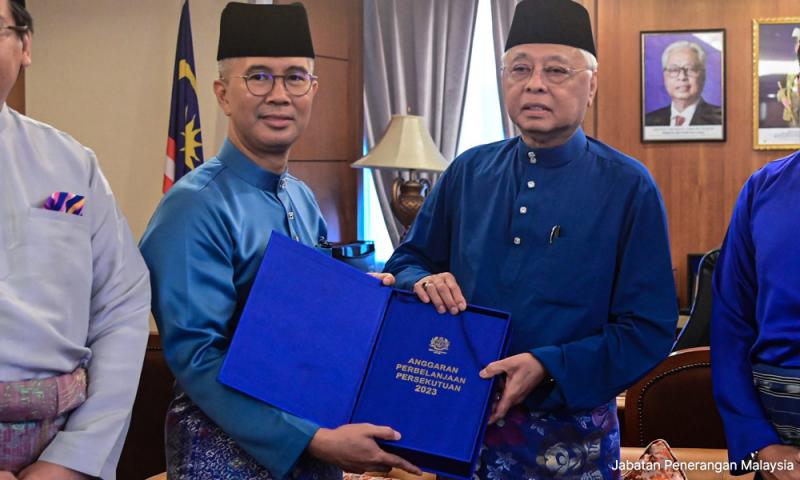LETTER | How Federal Constitution safeguards consolidated fund
LETTER | As reported on Friday, Ismail Sabri Yaakob’s government unveiled a record RM372.3 billion federal spending plan, under Budget 2023 that surpasses this year’s budget.
Every budget is essentially a Supply Bill before it is passed into a Supply Act. The bill must contain the estimated financial requirements for the expenditures that must be included in a Supply Bill by Article 100 of the Federal Constitution for the year concerned.
As provided under the Dewan Rakyat Standing Order 65, the details of these financial requirements shall be contained in the draft estimates of federal expenditure (the estimates) for the succeeding year which must be laid “upon the table before the introduction into the House of the annual Supply Bill.”
As such, like all bills the Supply Bill or better known as the budget, must be passed by Parliament, that is the Dewan Rakyat, and Dewan Negara, and assented to by the Yang di-Pertuan Agong.
The bill then becomes an act of Parliament, a federal law that authorises the government to spend from its coffers.
All government revenues and monies received must be accounted for in a fund, known as the consolidated fund under Article 97 of the Federal Constitution.
Article 97(1) states all revenues and monies raised or received by the federation shall be subjected to the provisions of this constitution and of federal law to be paid into and from one fund. This fund is known as the consolidated fund.
Article 97(2) states that all revenues and moneys howsoever raised or received by a state shall, subject to clause (3) be paid into and from one fund. This is known as the consolidated fund of that state.
The constitution protects and safeguards the federal consolidated fund in a number of ways.
First, Article 98 lays down the expenditure charged on the consolidated fund, which are:
There shall be charged on the consolidated fund, in addition to any grant, remuneration or other moneys so charged by any other article or federal law-
(a) all pensions, compensation for loss of office and gratuities for which the Federation is liable;
(b) all debts charges for which the federation is liable; and
(c) any moneys required to satisfy any judgment, decision or award against the federation by any court or tribunal.
Second, Article 99(1) requires the annual financial statement, to be laid before the Dewan Rakyat. This is a statement of the estimated receipt and expenditure of the federation for the year. For example, 2023. Unless Parliament otherwise provides, that statement shall be laid before the commencement of that year. This explains why Budget 2023 must be laid and passed before the commencement of year 2023.
Article 99(2) stipulates the estimated expenditure shall show:
(a) the total sums required to meet expenditure charged on the consolidated funds, and
(b) subject to Clause (3), the sums required to meet the expenditure for other purposes proposed to be met from the consolidated fund.
Third, Article 104, authorised withdrawals from the consolidated funds, provides as follows:
Subject to clause (2), no money shall be withdrawn from the consolidated fund unless they are:
(a) charged on the consolidated fund; or
(b) authorised to be issued by a Supply Act; or
(c) authorised to be issued under Article 102. (authorised on account or for unspecified purposes).
Clause (1) does not apply to any such sums as mentioned in clause(3) of Article 99.
No moneys shall be withdrawn from the consolidated fund except in the manner provided by federal law.
In short, the consolidated fund is protected by requiring the government to spend as authorised by Parliament.
As such, Budget 2023, tabled by the finance minister is a requirement under the constitution.
This is for the elected members of the Parliament to be introduced and eventually debate on the proposed expenditure before passing it to become a Supply Act.
Now Article 101, allows the government to table a Supplementary Supply Bill if:
(a) The amount appropriated by the Supply Act for any purpose is insufficient, or that a need has arisen for expenditure for a purpose for which no amount has been appropriated by the Supply Act; or
(b) That any moneys have been expended for any purpose in excess of the amount (if any) appropriated for that purpose by the Supply Act, a supplementary estimate showing the sums required or spent shall be laid before the House of Representative and the purposes of any such expenditure shall be included in a Supply Bill.
It underscores the requirement that government spending must be approved and authorised by Parliament.
The Federal Constitution clearly provides how and in what manner the consolidated fund can be used by the government.
This ensures a responsible government that spends as authorised by the people for the people.
The views expressed here are those of the author/contributor and do not necessarily represent the views of Malaysiakini.
RM12.50 / month
- Unlimited access to award-winning journalism
- Comment and share your opinions on all our articles
- Gift interesting stories to your friends
- Tax deductable
